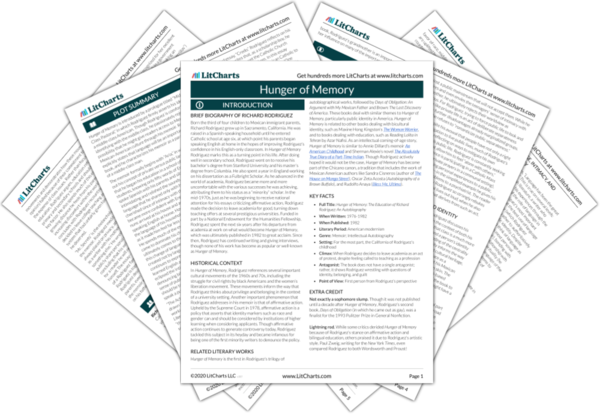Private vs. Public Identity
Hunger of Memory traces Rodriguez’s development from a “disadvantaged” youth—the son of Mexican immigrant parents, growing up in northern California—into a sought-after academic, lecturer, and author. At the core of Rodriguez’s development as an intellectual is the tension between his private self (who he is when he is with his family or when he is alone) and his public self (who he is when he is amongst strangers, particularly in school). While Rodriguez does…
read analysis of Private vs. Public IdentityRace, Class, and Identity
In Hunger of Memory, Rodriguez discusses his upbringing and identity in the context of both his race and his class, arguing that class is a much more useful frame through which to understand a person’s identity than race. Though Rodriguez’s understanding of the centrality of class to a person’s experience and identity informs the way he writes about topics such as academia and cultural heritage, he also—despite his opposition to centering race as a…
read analysis of Race, Class, and IdentityLanguage, Intimacy, and Authority
Rodriguez writes, “Language has been the great subject of my life.” This is true on several levels: Rodriguez is a scholar of English literature, a writer who understands and communicates his experiences through the written word, and a philosopher of the role of language in public and private life. One of Rodriguez’s most important assertions in Hunger of Memory is that the best use of language is not to create intimacy or community (which Rodriguez…
read analysis of Language, Intimacy, and Authority
Education, Ambition, and Belonging
Rodriguez sees his entrance into the education system as the defining moment of his life—so important, in fact, that the subtitle of his memoir is The Education of Richard Rodriguez. To Rodriguez, education is a process that radically changes people, whether they recognize this fact or not. As a self-proclaimed “scholarship boy,” Rodriguez feels intensely aware of the personal changes demanded by his education—and he seems willing to make these changes in order to…
read analysis of Education, Ambition, and BelongingMemory
Though memory features prominently in the title of this book, its role within the text is complex. From the outset Rodriguez claims that his book tells the story of “one life only.” This is an emphatic statement: that his memories are not representative of the Mexican American experience. Yet he simultaneously presents his memoir as a “parable” for the life of a middle class man, implying that he can speak for others of his class…
read analysis of MemoryFamily
Rodriguez dedicates this memoir to his parents—“to honor them,” he writes. Aside from Rodriguez’s own narrative voice, his mother and his father are the central figures of the novel. However, the reader learns relatively little about Rodriguez’s parents and hears only a few snippets of their dialogue, while Rodriguez’s brother and two sisters are even less present. Though Rodriguez laments the fact that his education has isolated him from his family members, his family continues…
read analysis of Family






